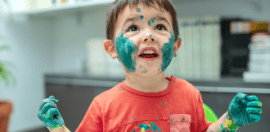COVID-19 through the eyes of children and young people

23 August 2021 at 6:03 pm
Many of our kids are in crisis. It’s up to us as parents, uncles, aunts, grandparents, carers and professionals, to keep the health and wellbeing of children and young people in our community in sharp focus, writes Deb Tsorbaris.
As the COVID-19 global pandemic continues, children and young people continue to live through unparalleled times. From changes in routine, reduced access to the physical school environment and playgrounds, and inability to catch up in person with friends, life has fundamentally changed for our young people.
While COVID-19 affects people in different ways, the social and economic impacts on young people have been substantial. Compared with older age groups, young people have experienced high rates of psychological distress, loneliness, educational disruption, unemployment, housing stress and domestic violence.
There is much cause for concern. While children have been largely spared the most severe symptoms of the COVID-19 infection, the Delta variant is spreading quickly among young people. Emerging research has noted that although acute infection in children is still generally milder than in adults, countries such as Britain and the United States have seen a surge in children hospitalisations. Locally, COVID-19 transmission amongst children has also increased.
Victorians have now surpassed the unfortunate but necessary milestone of 200 days in lockdown. We understand the important role the lockdowns play in keeping ourselves and our loved ones safe, however, we must keep children and young people in our focus as successive periods away from school, friends, and family take their toll.
To understand just how far reaching the impacts of COVID have been, we need only turn our minds back to Victoria’s second lockdown. Studies conducted by the University of Melbourne showed that Victorian kids’ mental health was hardest hit in 2020 during this period. Children who experienced the second lockdown in Victoria were two-to-five times more likely to show emotional and behavioural difficulties than children in the other states. Emotional and behavioural difficulties in children who experienced a second lockdown significantly increased during the three months between both surveys. Up to 13 per cent of these children experienced very high levels of emotional and behavioural difficulties. Anxiety was most common and there was a marked increase of 21 per cent in high to very high depression symptoms. Parents reported that 28 per cent of children were clingier and 36 per cent demanded more attention and support. The demand for child and family services also increased rapidly during this time with reports that one in four families were accessing additional support.
In sharp focus for lockdown six are the mental health concerns arising from COVID-19. It’s not hard to understand why when you consider the compounding impacts of social isolation, education disruptions, effects on family life, and changes to plans and usual activities. Recently, Kids Helpline has revealed just some of the heartbreaking calls they’re fielding from Australian kids who need help in lockdown. The service helpline received over 10,000 calls last week, including calls from 3,277 kids in locked-down NSW, 2,663 in Victoria and 1,583 in Queensland. Kids Helpline is reporting that its work has become increasingly complex, that the calls are longer, and more instances are requiring police, ambulances and working with child protection. Many of our kids are in crisis, which is why it’s more critical than ever that they can access the support services they need, when they need them.
While some effects of COVID-19 on young people are emerging, it is important to note that the full impact is complex and not yet fully understood. The effect of COVID-19 can also be dynamic – outcomes change quickly (for instance, mental wellbeing and social connectedness) when conditions change (such as introducing or easing restrictions). Many of the effects of COVID-19 will be interrelated and could take some time to become apparent.
What is evident now is that as parents, uncles, aunts, grandparents, carers and professionals, we must keep the health and wellbeing of children and young people in our community in sharp focus and provide some much needed stability during turbulent times.







